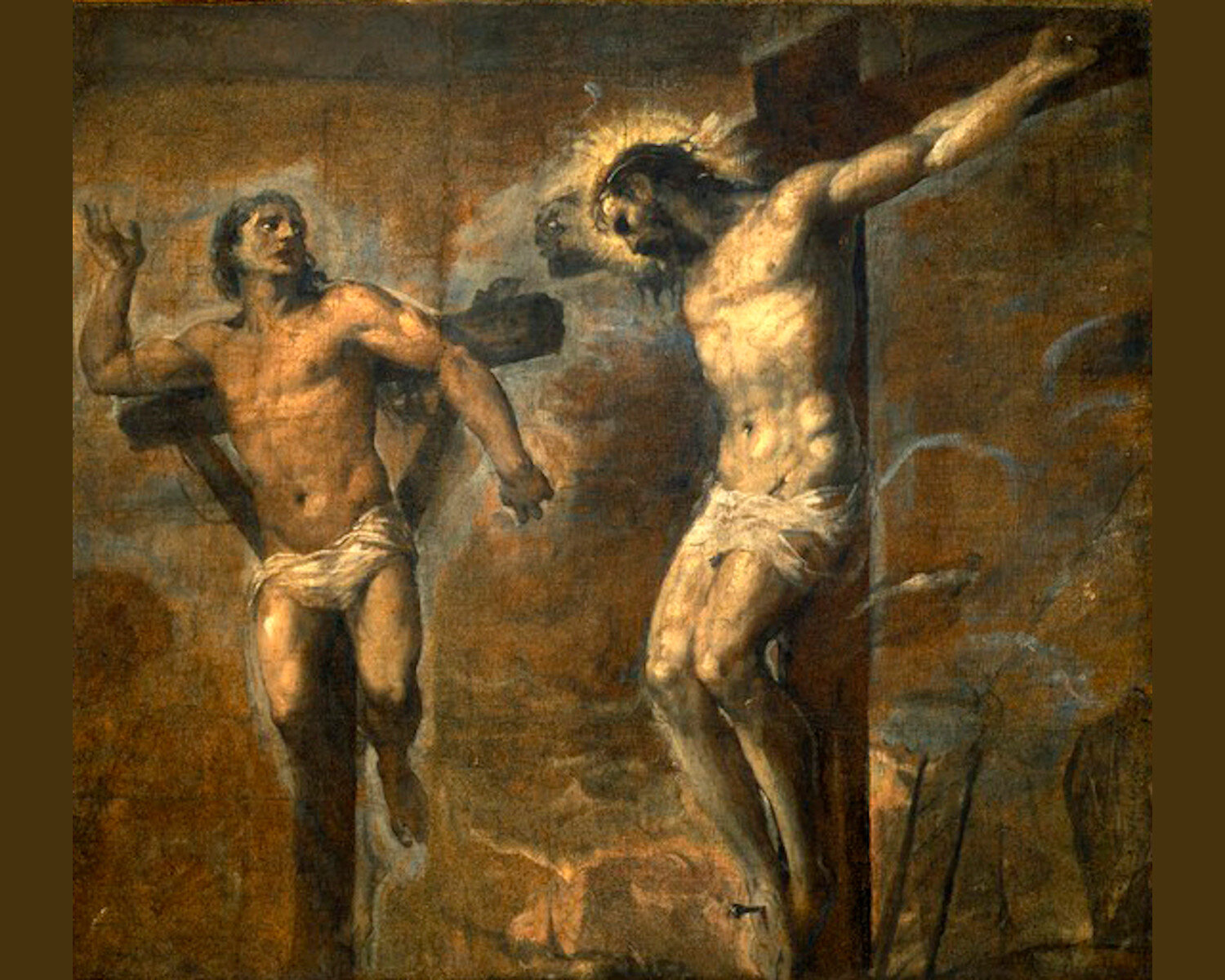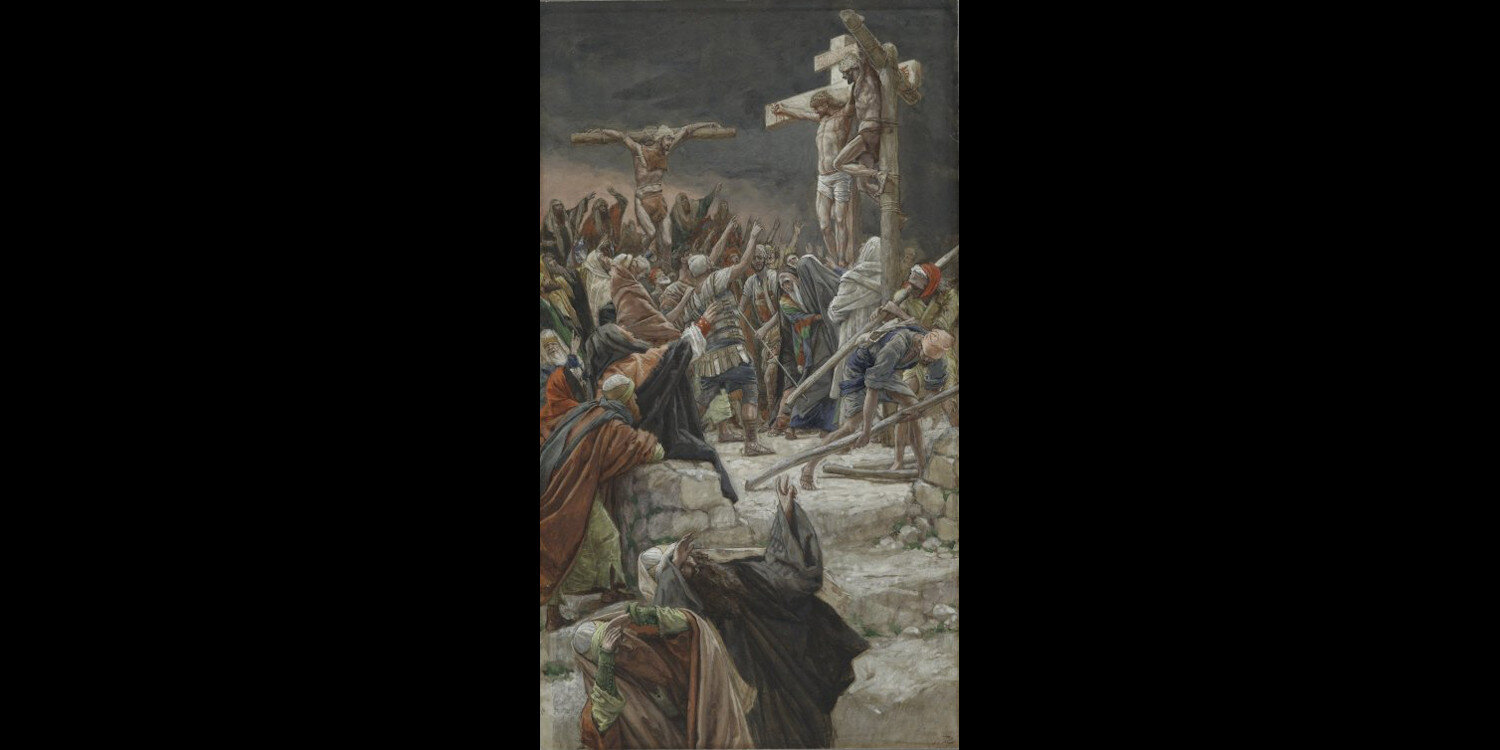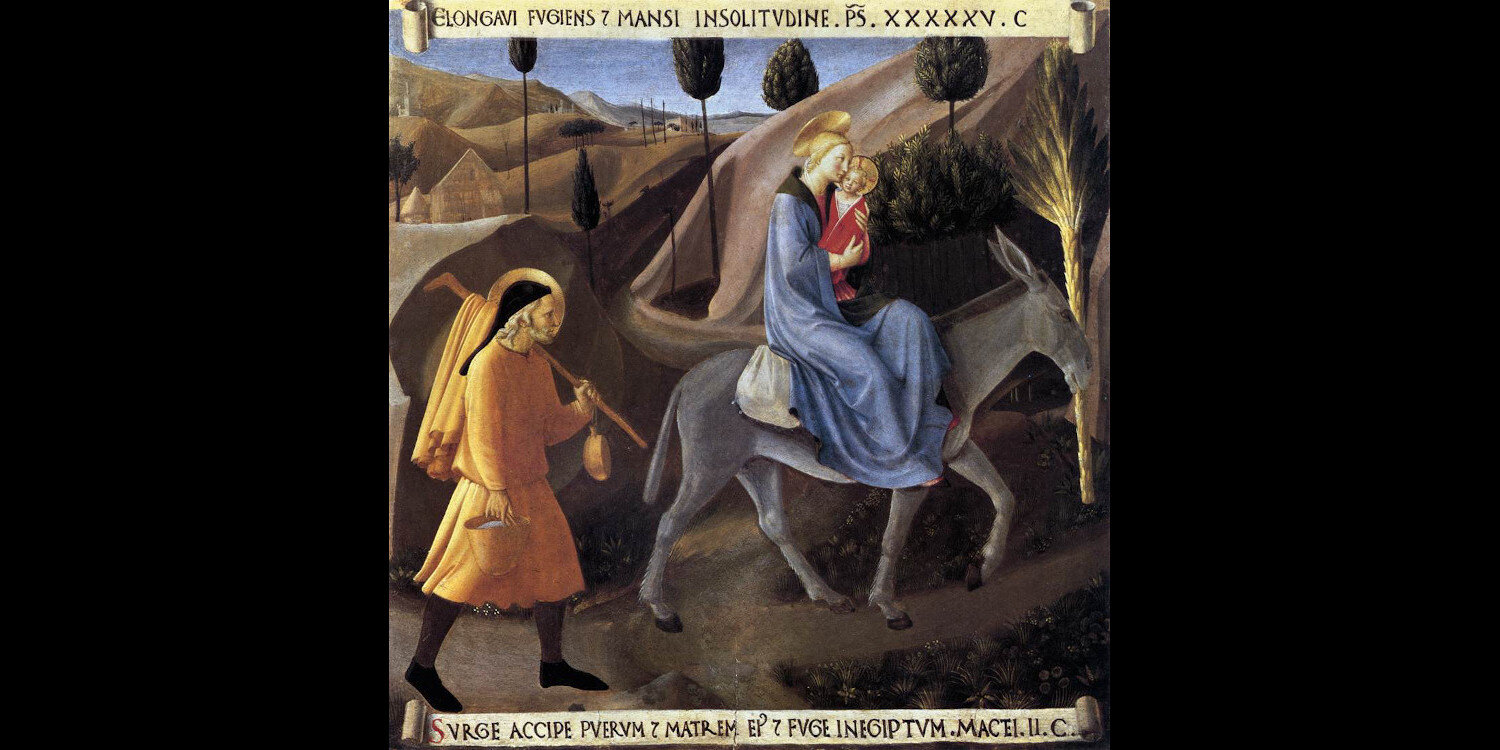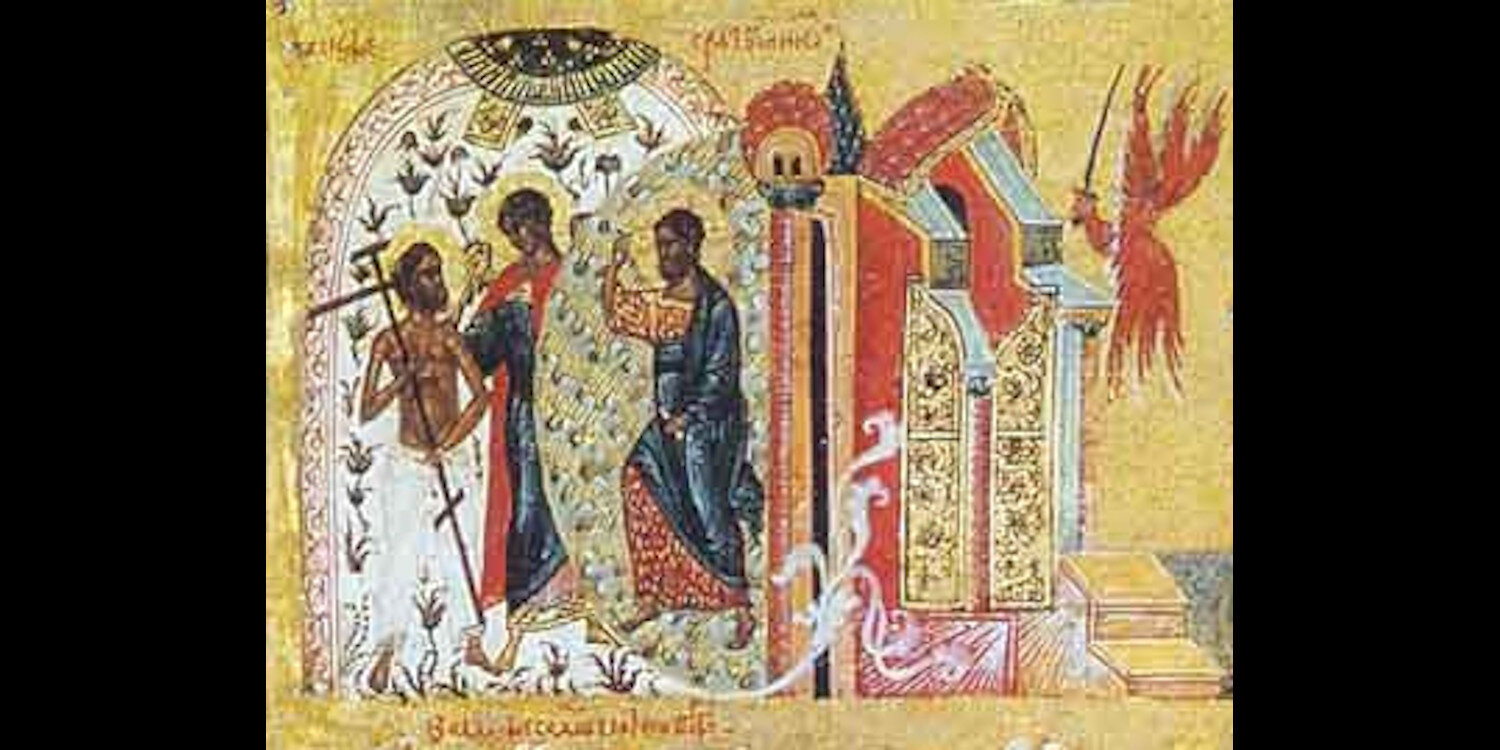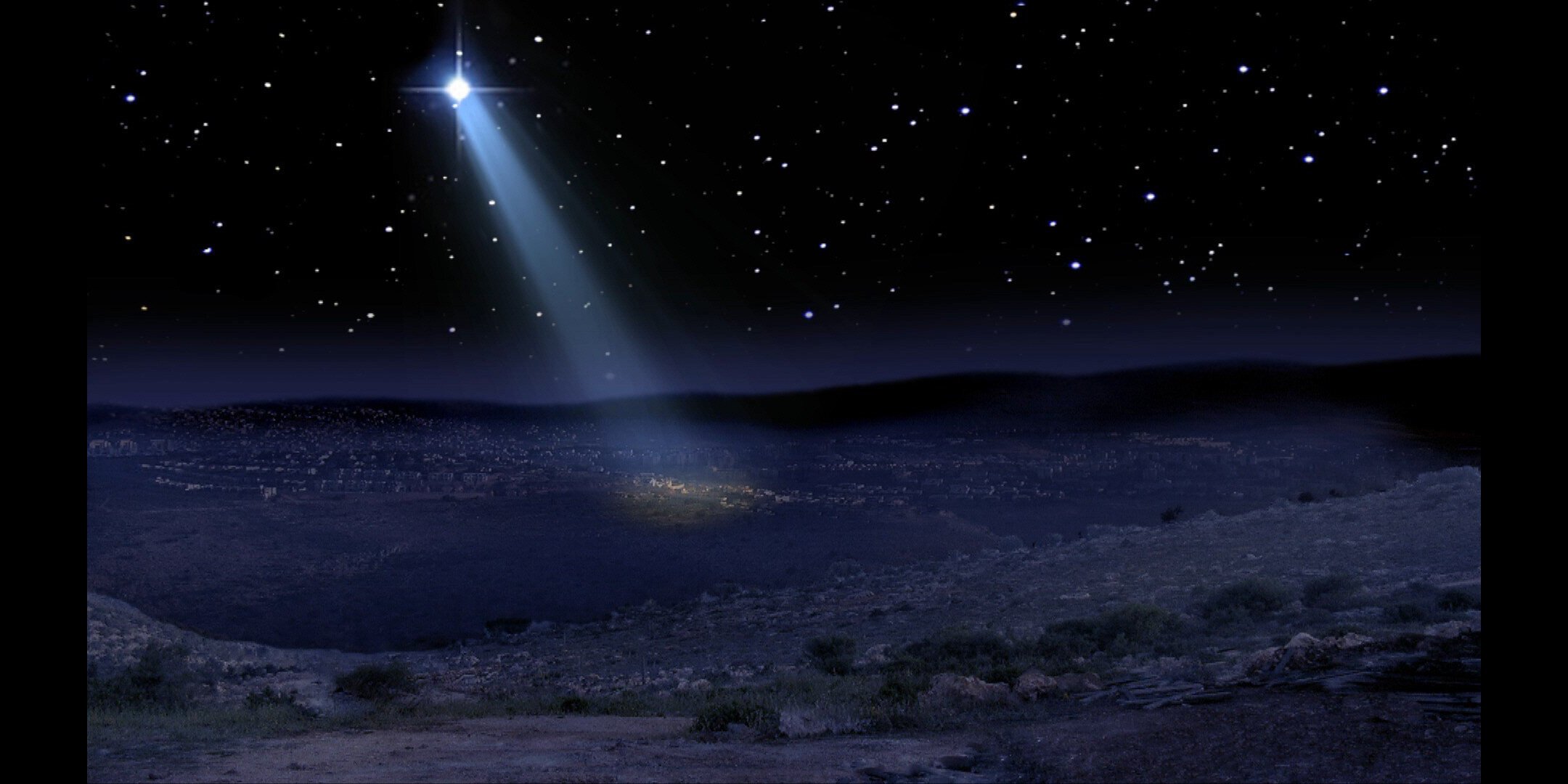“There are few authentic prophetic voices among us, guiding truth-seekers along the right path. Among them is Fr. Gordon MacRae, a mighty voice in the prison tradition of John the Baptist, Maximilian Kolbe, Alfred Delp, SJ, and Dietrich Bonhoeffer.”
— Deacon David Jones
Dismas, Crucified to the Right: Paradise Lost and Found
Who was Saint Dismas, the Penitent Thief, crucified to the right of Jesus at Calvary? His brief Passion Narrative appearance has deep meaning for Christians.
Who was Saint Dismas, the Penitent Thief, crucified to the right of Jesus at Calvary? His brief Passion Narrative appearance has deep meaning for Salvation.
“All who see me scoff at me. They mock me with parted lips; they wag their heads.”
During Holy Week one year, I wrote “Simon of Cyrene, the Scandal of the Cross, and Some Life Sight News.” It was about the man recruited by Roman soldiers to help carry the Cross of Christ. I have always been fascinated by Simon of Cyrene, but truth be told, I have no doubt that I would react with his same spontaneous revulsion if fate had me walking in his sandals that day past Mount Calvary.
Some BTSW readers might wish for a different version, but I cannot write that I would have heroically thrust the Cross of Christ upon my own back. Please rid yourselves of any such delusion. Like most of you, I have had to be dragged kicking and screaming into just about every grace I have ever endured. The only hero at Calvary was Christ. The only person worth following up that hill — up ANY hill — is Christ. I follow Him with the same burdens and trepidation and thorns in my side as you do. So don’t follow me. Follow Him.
This Holy Week, one of many behind these stone walls, has caused me to use a wider angle lens as I examine the events of that day on Mount Calvary as the Evangelists described them. This year, it is Dismas who stands out. Dismas is the name tradition gives to the man crucified to the right of the Lord, and upon whom is bestowed a dubious title: the “Good Thief.”
As I pondered the plight of Dismas at Calvary, my mind rolled some old footage, an instant replay of the day I was sent to prison — the day I felt the least priestly of all the days of my priesthood.
It was the mocking that was the worst. Upon my arrival at prison after trial late in 1994, I was fingerprinted, photographed, stripped naked, showered, and unceremoniously deloused. I didn’t bother worrying about what the food might be like, or whether I could ever sleep in such a place. I was worried only about being mocked, but there was no escaping it. As I was led from place to place in chains and restraints, my few belongings and bedding stuffed into a plastic trash bag dragged along behind me, I was greeted by a foot-stomping chant of prisoners prepped for my arrival: “Kill the priest! Kill the priest! Kill the priest!” It went on into the night. It was maddening.
It’s odd that I also remember being conscious, on that first day, of the plight of the two prisoners who had the misfortune of being sentenced on the same day I was. They are long gone now, sentenced back then to just a few years in prison. But I remember the walk from the courthouse in Keene, New Hampshire to a prison-bound van, being led in chains and restraints on the “perp-walk” past rolling news cameras. A microphone was shoved in my face: “Did you do it, Father? Are you guilty?”
You may have even witnessed some of that scene as the news footage was recently hauled out of mothballs for a WMUR-TV news clip about my new appeal. Quickly led toward the van back then, I tripped on the first step and started to fall, but the strong hands of two guards on my chains dragged me to my feet again. I climbed into the van, into an empty middle seat, and felt a pang of sorrow for the other two convicted criminals — one in the seat in front of me, and the other behind.
“Just my %¢$#@*& luck!” the one in front scowled as the cameras snapped a few shots through the van windows. I heard a groan from the one behind as he realized he might vicariously make the evening news. “No talking!” barked a guard as the van rolled off for the 90 minute ride to prison. I never saw those two men again, but as we were led through the prison door, the one behind me muttered something barely audible: “Be strong, Father.”
Revolutionary Outlaws
It was the last gesture of consolation I would hear for a long, long time. It was the last time I heard my priesthood referred to with anything but contempt for years to come. Still, to this very day, it is not Christ with whom I identify at Calvary, but Simon of Cyrene. As I wrote in “Simon of Cyrene and the Scandal of the Cross“:
“That man, Simon, is me . . . I have tried to be an Alter Christus, as priesthood requires, but on our shared road to Calvary, I relate far more to Simon of Cyrene. I pick up my own crosses reluctantly, with resentment at first, and I have to walk behind Christ for a long, long time before anything in me compels me to carry willingly what fate has saddled me with . . . I long ago had to settle for emulating Simon of Cyrene, compelled to bear the Cross in Christ’s shadow.”
So though we never hear from Simon of Cyrene again once his deed is done, I’m going to imagine that he remained there. He must have, really. How could he have willingly left? I’m going to imagine that he remained there and heard the exchange between Christ and the criminals crucified to His left and His right, and took comfort in what he heard. I heard Dismas in the young man who whispered “Be strong, Father.” But I heard him with the ears of Simon of Cyrene.
Like a Thief in the Night
Like the Magi I wrote of in “Upon a Midnight Not So Clear,” the name tradition gives to the Penitent Thief appears nowhere in Sacred Scripture. Dismas is named in a Fourth Century apocryphal manuscript called the “Acts of Pilate.” The text is similar to, and likely borrowed from, Saint Luke’s Gospel:
“And one of the robbers who were hanged, by name Gestas, said to him: ‘If you are the Christ, free yourself and us.’ And Dismas rebuked him, saying: ‘Do you not even fear God, who is in this condemnation? For we justly and deservedly received these things we endure, but he has done no evil.’”
What the Evangelists tell us of those crucified with Christ is limited. In Saint Matthew’s Gospel (27:38) the two men are simply “thieves.” In Saint Mark’s Gospel (15:27), they are also thieves, and all four Gospels describe their being crucified “one on the left and one on the right” of Jesus. Saint Mark also links them to Barabbas, guilty of murder and insurrection. The Gospel of Saint John does the same, but also identifies Barabbas as a robber. The Greek word used to identify the two thieves crucified with Jesus is a broader term than just “thief.” Its meaning would be more akin to “plunderer,” part of a roving band caught and given a death penalty under Roman law.
Only Saint Luke’s Gospel infers that the two thieves might have been a part of the Way of the Cross in which Saint Luke includes others: Simon of Cyrene carrying Jesus’ cross, and some women with whom Jesus spoke along the way. We are left to wonder what the two criminals witnessed, what interaction Simon of Cyrene might have had with them, and what they deduced from Simon being drafted to help carry the Cross of a scourged and vilified Christ.
In all of the Gospel presentations of events at Golgotha, Jesus was mocked. It is likely that he was at first mocked by both men to be crucified with him as the Gospel of St. Mark describes. But Saint Luke carefully portrays the change of heart within Dismas in his own final hour. The sense is that Dismas had no quibble with the Roman justice that had befallen him. It seems no more than what he always expected if caught:
“One of the criminals who were hanged railed at him, saying, ‘Are you not the Christ? Save yourself and us!’ But the other rebuked him, saying, ‘Do you not fear God since you are under the same sentence of condemnation? And we indeed justly, for we are receiving the due reward of our deeds; but this man has done nothing wrong.’ ”
The Flight into Egypt
The name, “Dismas” comes from the Greek for either “sunset” or “death.” In an unsubstantiated legend that circulated in the Middle Ages, in a document known as the “Arabic Gospel of the Infancy,” this encounter from atop Calvary was not the first Gestas and Dismas had with Jesus. In the legend, they were a part of a band of robbers who held up the Holy Family during the Flight into Egypt after the Magi departed in Saint Matthews Gospel (Matthew 2:13-15).
This legendary encounter in the Egyptian desert is also mentioned by Saint Augustine and Saint John Chrysostom who, having heard the same legend, described Dismas as a desert nomad, guilty of many crimes including the crime of fratricide, the murder of his own brother. This particular part of the legend, as you will see below, may have great symbolic meaning for salvation history.
In the legend, Saint Joseph, warned away from Herod by an angel (Matthew 2:13-15), opted for the danger posed by brigands over the danger posed by Herod’s pursuit. Fleeing with Mary and the child into the desert toward Egypt, they were confronted by a band of robbers led by Gestas and a young Dismas. The Holy Family looked like an unlikely target having fled in a hurry, and with very few possessions. When the robbers searched them, however, they were astonished to find expensive gifts of gold, frankincense, and myrrh — the Gifts of the Magi. However, in the legend Dismas was deeply affected by the infant, and stopped the robbery by offering a bribe to Gestas. Upon departing, the young Dismas was reported to have said:
“0 most blessed of children, if ever a time should come when I should crave thy mercy, remember me and forget not what has passed this day.”
Paradise Found
The most fascinating part of the exchange between Jesus and Dismas from their respective crosses in Saint Luke’s Gospel is an echo of that legendary exchange in the desert 33 years earlier — or perhaps the other way around:
“‘Jesus, remember me when you come into your kingly power.’ And he said to him, ‘Truly I say to you, today you will be with me in Paradise.’”
The word, “Paradise” used by Saint Luke is the Persian word, “Paradeisos” rarely used in Greek. It appears only three times in the New Testament. The first is that statement of Jesus to Dismas from the Cross in Luke 23:43. The second is in Saint Paul’s description of the place he was taken to momentarily in his conversion experience in Second Corinthians 12:3 — which I described in “The Conversion of Saint Paul and the Cost of Discipleship.” The third is the heavenly paradise that awaits the souls of the just in the Book of Revelation (2:7).
In the Old Testament, the word “Paradeisos” appears only in descriptions of the Garden of Eden in Genesis 2:8, and in the banishment of Cain after the murder of his brother, Abel:
“Cain left the presence of the Lord and wandered in the Land of Nod, East of Eden.”
Elsewhere, the word appears only in the prophets (Isaiah 51:3 and Ezekiel 36:35) as they foretold a messianic return one day to the blissful conditions of Eden — to the condition restored when God issues a pardon to man.
If the Genesis story of Cain being banished to wander “In the Land of Nod, East of Eden” is the symbolic beginning of our human alienation from God — the banishment from Eden marking an end to the State of Grace and Paradise Lost — then the Dismas profession of faith in Christ’s mercy is symbolic of Eden restored — Paradise Regained.
From the Cross, Jesus promised Dismas both a return to spiritual Eden and a restoration of the condition of spiritual adoption that existed before the Fall of Man. It’s easy to see why legends spread by the Church Fathers involved Dismas guilty of the crime of fratricide just as was Cain.
A portion of the cross upon which Dismas is said to have died alongside Christ is preserved at the Church of Santa Croce in Rome. It’s one of the Church’s most treasured relics. Catholic apologist, Jim Blackburn has proposed an intriguing twist on the exchange on the Cross between Christ and Saint Dismas. In “Dismissing the Dismas Case,” an article in the superb Catholic Answers Magazine Jim Blackburn reminded me that the Greek in which Saint Luke’s Gospel was written contains no punctuation. Punctuation had to be added in translation. Traditionally, we understand Christ’s statement to the man on the cross to his right to be:
“Truly I say to you, today you will be with me in Paradise.”
The sentence has been used by some non-Catholics (and a few Catholics) to discount a Scriptural basis for Purgatory. How could Purgatory be as necessary as I described it to be in “The Holy Longing” when even a notorious criminal is given immediate admission to Paradise? Ever the insightful thinker, Jim Blackburn proposed a simple replacement of the comma giving the verse an entirely different meaning:
“Truly I say to you today, you will be with me in Paradise.”
Whatever the timeline, the essential point could not be clearer. The door to Divine Mercy was opened by the events of that day, and the man crucified to the right of the Lord, by a simple act of faith and repentance and reliance on Divine Mercy, was shown a glimpse of Paradise Regained.
The gift of Paradise Regained left the cross of Dismas on Mount Calvary. It leaves all of our crosses there. Just as Cain set in motion our wandering “In the Land of Nod, East of Eden,” Dismas was given a new view from his cross, a view beyond death, away from the East of Eden, across the Undiscovered Country, toward eternal home.
Saint Dismas, pray for us.
+ + +
Upon a Midnight Not So Clear, Some Wise Men from the East Appear
There is a back story to the Magi of Saint Matthew's account of the Birth of Christ, and it is the Gospel for the Epiphany of the Lord.
There’s a back story to the Magi of Saint Matthew’s account of the Birth of Christ, and it is the Gospel for the Epiphany of the Lord.
In early December each year, prisoners here can purchase a 20-lb food package from a vendor. They drop hints to their families, and those without families scrape and save their meager prison pay all year. No one here wants to pass up a chance to purchase food they otherwise won’t see again until next year. Most are practical about it. They skip the candy and cookies to buy more sustaining items like real coffee, and meal alternatives they can save for the worst days in the prison chow hall.
The packages arrived last week, and for days prisoners have been bringing me samples of their culinary creations. They come to my cell door with an endless parade of sandwiches, wraps, and pizzas. I learned long ago that refusing the food leaves a lot of hurt feelings. They not only insist that I eat it, but they insist on staying until I declare that their culinary skill surpasses all others. It’s beginning to look a lot like Christmas when I have to struggle into my pants in the morning.
There’s a point to these visits. Prisoners tell me about their own back stories, and the prospect of another Christmas in prison. They want to hear that they are not without hope. Most of all, they want to know that Christmas means more than the empty, shallow “holiday season” it has become on TV.
But this morning, my Japanese friend, Koji, stopped by with some coffee he brewed using an old sock. (Trust me, you don’t want the gory details!). Koji handed me a cup — it’s pretty good, actually — and asked, “What can you tell me about the Magi?” That was odd because I’ve been thinking of writing about the Magi for Christmas. I told Koji I’ll let him read this post when finished. Maybe he’ll bring me more coffee made with that old sock of his. Lord, give me the strength to bear my blessings! Anyway, there’s no better place to begin the Magi story than St. Matthew’s own words:
“Now when Jesus was born in Bethlehem of Judea in the days of Herod the king, behold, wise men from the East came to Jerusalem, saying, ‘Where is he who has been born king of the Jews? For we have seen his star in the East, and have come to worship him.’ When Herod the king heard this, he was troubled, and all Jerusalem with him; and assembling all the chief priests and scribes of the people, he inquired of them where the Christ was to be born. They told him, ‘In Bethlehem of Judea; for so it is written by the prophet:
‘And you, 0 Bethlehem, in the land of Judah, are by no means least among the rulers of Judah; for from you shall come a ruler who will govern my people, Israel.’
Then Herod summoned the wise men secretly and ascertained from them what time the star had appeared; and he sent them to Bethlehem, saying, ‘Go and search diligently for the child, and when you have found him bring me word, that I too may come and worship him.’ When they had heard the king, they went their way; and lo, the star which they had seen in the East went before them, till it came to rest over the place where the child was. When they saw the star, they rejoiced exceedingly with great joy; and going into the house they saw the child with Mary his mother, and they fell down and worshipped him. Then, opening their treasures, they offered him gifts, gold, frankincense and myrrh. And being warned in a dream not to return to Herod, they departed to their own country by another way.”
Myth, Midrash, or Both?
This story, as Saint Matthew relates it, is a myth. But don’t get me wrong. That does not mean the story isn’t true. In fact, I firmly believe that it is true. The word, “myth,” coming from the Greek “mythos,” simply means “story,” and makes no judgement on whether a story is historical. Myth is not synonymous with falsehood despite how its more modern meaning has been twisted into such a conclusion. In theology and Biblical studies, myth simply denotes a story imbued with rich theological and symbolic meaning, but that does not mean it’s devoid of historical truth.
Biblical myth is distinguished from legends and “folklore” by the way it offers explanations about the facts of a story. In myth, the explanations stand whether the facts stand or not, and the value of the story does not depend on its historical accuracy. Perhaps the best example is the Creation story of Genesis, Chapter 1. In my post, “A Day Without Yesterday,” the great Belgian physicist, Father Georges Lemaitre, turned modern cosmology on its head with his theory of the Big Bang. For Pope Pius XI, this proof of a universe that begins and ends in history affirmed the elemental truth of Biblical Creation.
When I say that the story of the Magi is true, however, I mean truth in both senses. The understanding the story conveys is the truth. The historical facts of the story are also the truth, and we have no reason to doubt them.
The account of the Magi is also a “midrash.” Midrash is a Hebrew term meaning “interpretation.” It’s a characteristic of many of the reflections in the Aggadah — which in Hebrew means “narrative.” The Aggadah is a collection of Rabbinic reflection and teaching gathered over a thousand years. Midrash is a type of literature from the Aggadah that interprets Biblical texts by linking them together and discerning their hidden meanings.
Like myth, midrash is not a declaration that a Biblical passage is not historical or true just because it contains elements of other Biblical texts. In Saint Matthew’s Gospel, the Magi story points to many elements in Old Testament Scriptures. Jewish Christians hearing Saint Matthew’s account of the Magi, for example, would connect the Star in the East witnessed by the Magi with the star Balaam (a sort of Magus figure) envisioned arising out of Jacob in a dream-like account described in the Book of Numbers 24:17. Herod’s affront with the idea of a Hebrew King in the Magi account echoes Balaam’s vision as well. Herod is of the Edomite clan. In Balaam’s vision, the star arising out of Jacob is a portent that “Edom shall be dispossessed.” (Numbers 24:18).
The account of wicked King Herod feeling threatened by the life of the infant Jesus recalls clearly the Exodus account of a wicked Pharaoh who, having enslaved the Jews, seeks the life of the infant Moses. And in the Infancy Narrative of Saint Luke’s Gospel, the story of Zechariah and Elizabeth conceiving a child in their old age is clearly an echo of the Genesis story of Abraham, Sarah, and Isaac.
In “Saint Gabriel the Archangel: When the Dawn from On High Broke Upon Us,” I wrote of how St. Luke drew many midrashic links with the Hebrew Scriptures in his account of the Angelic visit to Mary at the Annunciation. The account of Mary visiting Elizabeth in the hill country of Judea recalls David visiting the very same place to retrieve the Ark of the Covenant as told in 2 Samuel, Chapter 6. Even the story of the future John the Baptist leaping in his mother’s womb in the presence of Mary is midrashic. In 2 Samuel, David leaps for joy in the presence of the Ark of the Covenant. I find these echoes of the Old Testament to be fascinating, but they don’t leave the story’s historical truth in question, including the Magi story.
I have a modern analogy in my own family. I wrote about my father’s conversion in “What Do John Wayne and Pornchai Moontri Have in Common?” My father’s parents had four children. He grew up with two brothers and a sister. One of his brothers became a priest. A generation later, my father and mother had four children. I also grew up with two brothers and a sister. Both I and my father’s brother who became a priest were the second son in our families. Many of the stories of my own childhood have eerie echoes in my father’s childhood. This is what is meant by midrash.
The Epiphany is depicted in a mural titled “Adoration of the Magi” in the Basilica of the Immaculate Conception at Conception Abbey in Conception, MO. Painted by Benedictine monks in the late 1800s.
The Gifts of the Magi
There are elements within our popular understanding of the story of the Magi, however, that history has added over the centuries. For example, nothing in Saint Matthew’s account indicates that the Magi were three in number. The sole hint is in the number of their gifts: gold, frankincense, and myrrh. And despite the popular Christmas carol, “We Three Kings,” there is nothing in Saint Matthew’s account to indicate that they were kings. This account became linked to a passage in Isaiah:
“And nations shall come to your light, and kings to the brightness of your rising . . . they shall bring gold and frankincense, and shall proclaim the praise of the Lord.”
And linked as well was a passage about kings bringing tribute in Psalm 72:
“May the kings of Tarshish and of the isles render him tribute; may the kings of Sheba and Seba bring gifts”
Much theological symbolism for the gifts themselves was reflected upon later. Saint Ireneaus held that the Gifts of the Magi signify Christ Incarnate. Gold, a symbol of royalty, signifies Christ the King. Frankincense, used throughout ancient Israel in the worship of God, signifies divinity, and myrrh, an anointing oil for burial, signifies the Passion and death of the Messiah.
Saint Gregory the Great added to this interpretation with the Gifts of the Magi symbolizing our duty toward Christ in our daily lives. Gold signifies Christ’s wisdom and our deference. Frankincense signifies our prayer and adoration of Christ, and myrrh signifies our daily sacrifices as a share in the suffering of Christ. The names of the Magi — Gaspar, Melchior, and Balthazar — came out of a sixth century legend.
East of Eden
It’s widely held in Catholic scholarship that the Magi represent the first Gentiles to come to worship the Christ. There is one strain of scholarship that makes reference to the fact that they were astrologers who represented the world of magic. Most scholars see the Magi as followers of Zoroaster, an Indo-Iranian prophet who lived 12 centuries before Christ. Throughout the eastern world, followers of Zoroaster dominated religious thought for centuries. And yet there they are, kneeling in the presence of Christ. The symbolism is that as Christ reigns supreme, all other magic goes out of the world and loses its power and authority. It’s a beautiful and powerful image of the universal Kingship of Christ for all time, and the vast change his birth brought to the history of humankind.
I have an additional theory of my own about the hidden meaning of the account of the Magi, but I have been unable to find any reference to it in the work of any Biblical scholar, Catholic or otherwise. So I’m on my own in this wilderness of midrashic symbols. It’s true that the Magi represent all the world beyond Judaism coming into a covenant relationship with God through Christ. But great pains are taken by Saint Matthew to remind us repeatedly that the Magi are coming out of the East — and he capitalized “East.” It seems to me to be intended to designate more than just a compass point. The fact that they came from the East, and saw his star in the East, is repeated by Saint Matthew three times in this brief account.
In one of my posts on These Stone Walls — “In the Land of Nod, East of Eden” — I wrote of how both Adam and Eve were banished East of Eden after the Fall of Man (Genesis 3:24). It was both a punishment and a deterrent. God then placed a Cherubim with a flaming sword to the East of Eden to bar Man’s return.
A generation later, after the murder of his brother, Abel, Cain was also banished. Cain “went away from the presence of the Lord and dwelt in the Land of Nod, East of Eden (Genesis 4:14). The “Land of Nod” has no other reference in all of Scripture, and is widely interpreted to have its origin in the Hebrew term, “nad,” which means “to wander.” Cain himself described his fate in just this way:
“From thy face I shall be hidden; I shall be a fugitive and a wanderer on the earth.”
I count 21 references to an ill wind from the East throughout Sacred Scripture, but not one such reference after the Birth of Christ. An example is this one from the Prophet Isaiah:
“Measure by measure, by exile thou didst contend with them; he removed them with his fierce blast in the day of the east wind.”
For me, the Magi represent also those who have fallen, who have become alienated from God and banished East of Eden. They saw his star there, and followed its light. I am in a place filled with men who lived their entire lives East of Eden, and for them the Magi are a sign of Good News — the very best news. Freedom can be found in only one place: and the way there is the Star of Bethlehem.
Amid the Encircling Gloom
My cell window faces West so my gaze is always out of the East. On this cold and gray December day, the sun is just now setting behind the high prison wall, and glistening upon the spirals of razor wire like tinsel. Its final glimmer of light is just now fading from view. I am reminded of my favorite prayer, a gift from another wise man, Blessed John Henry Newman, and it has become a tradition of sorts as the Sun sets on These Stone Walls at Christmas. I can hear the Magi praying this as they follow that Star out of the East. On my 18th Christmas in prison, this is my prayer for you as well:
“Lead, kindly Light, amid the encircling gloom,
Lead Thou me on.
The night is dark, and I am far from home;
Lead Thou me on
Keep Thou my feet; I do not ask to see
The distant scene; One step enough for me.
I was not ever thus,
Nor prayed that Thou shouldst lead me on;
I loved to choose and see my path,
But now lead Thou me on.
I loved the garish day, and, spite of fears,
Pride ruled my will; remember not past years.
So long Thy power hath blessed me,
Sure it still will lead me on
O’er moor and fen, o’er crag and torrent
Till the night is gone,
And with the morn those Angel faces smile,
Which I have loved long since, and lost awhile.”
The readers of These Stone Walls have cast a light into the darkness and isolation of prison this year. It’s a light that illuminates the path from East of Eden, and it is magnified ever so brightly, in my life and in yours, by the Birth of Christ. The darkness can never, ever, ever overcome it.

